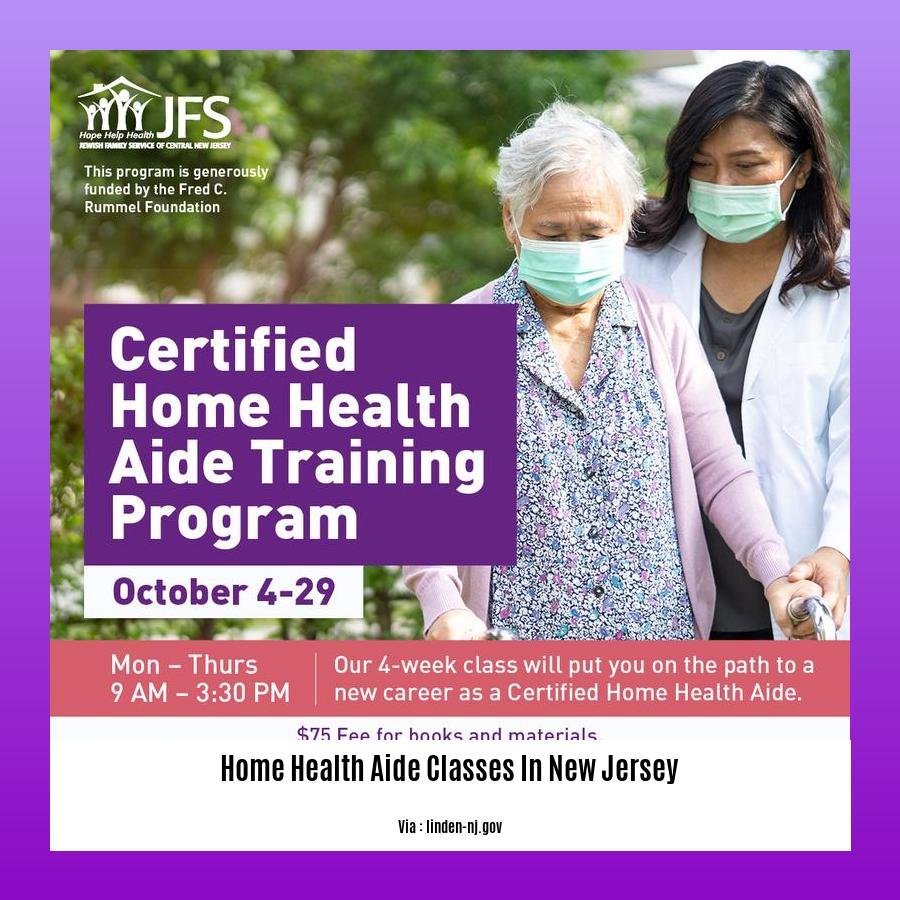Discover the Fulfilling Path of Caregiving with Home Health Aide Classes in New Jersey: Embark on a Rewarding Career in Providing Compassionate Assistance to Individuals in Need.
Key Takeaways:
-
New Jersey requires certification as a Homemaker-Health Aide (CHHA) to work as a home health aide.
-
Training programs, approved by the Board of Nursing, consist of at least 76 hours and can be offered by home care agencies, educational institutions, or accredited agencies.
-
Requirements include successful completion of an approved training program, competency evaluation, criminal background check, and CPR and first aid certification.
-
Costs vary depending on the training program and institution, but some may offer financial aid or scholarships.
-
Job prospects in New Jersey are expected to grow due to the aging population, with employment opportunities in private homes, nursing homes, and assisted living facilities.
Home Health Aide Classes in New Jersey: Pursue a Rewarding Career in Caregiving

Making a Difference in Your Community
In the realm of healthcare, home health aides play a pivotal role in providing compassionate care and support to individuals in their homes. If you’re passionate about making a meaningful difference in the lives of others, pursuing a career as a home health aide in New Jersey might be the perfect path for you. With the aging population and growing demand for in-home care services, the field of home health aide is experiencing a surge in opportunities.
Getting Started: Requirements and Steps
-
Embrace the Role of a Home Health Aide (HHA): Embrace the role of a home health aide, where you’ll be responsible for providing comprehensive care to individuals in their homes. Your duties may include assisting with personal care, medication management, meal preparation, light housekeeping, and offering companionship and emotional support.
-
Navigating Certification and Training: To work as a home health aide in New Jersey, you must be certified as a Homemaker-Health Aide (CHHA) through an approved training program. These programs typically consist of 76 hours of training and cover various aspects of home care, such as infection control, safety procedures, and communication skills.
-
Completing the Competency Evaluation: After completing the training program, you’ll need to pass a competency evaluation conducted by the New Jersey Board of Nursing. This evaluation assesses your skills and knowledge in providing home care services.
-
Ensuring Compliance with Other Requirements: Additional requirements include a criminal background check, CPR and first aid certification, and completion of a tuberculosis (TB) test.
Becoming a Home Health Aide: A Step-by-Step Guide
-
Gather Information: Research home health aide classes in New Jersey to find approved training programs in your area. Check their curriculum, schedule, and cost to select the program that best suits your needs.
-
Complete the Training Program: Enroll in the chosen training program and attend classes regularly. Actively participate in lectures, discussions, and hands-on training sessions to gain a comprehensive understanding of home care practices.
-
Pass the Competency Evaluation: Prepare diligently for the competency evaluation conducted by the New Jersey Board of Nursing. Ensure you have a firm grasp of the material covered in the training program.
-
Fulfill Additional Requirements: Obtain CPR and first aid certification, undergo a criminal background check, and complete a tuberculosis (TB) test.
-
Begin Your Rewarding Career: With your certification in hand, you can apply for home health aide positions in various settings, including private homes, nursing homes, and assisted living facilities.
Benefits and Opportunities in Home Health Care
-
High Demand and Job Growth: The demand for home health aides is expected to surge in New Jersey due to the aging population and increasing preference for receiving care at home. This means ample job opportunities and a stable career path.
-
Making a Meaningful Impact: As a home health aide, you’ll have the privilege of positively impacting the lives of individuals and their families by providing compassionate care and support. Your work can make a profound difference in their daily lives.
-
Flexibility and Work-Life Balance: Home health aides often enjoy flexible work schedules that allow them to balance their personal and professional lives effectively.
-
Opportunities for Advancement: With experience and additional training, home health aides can advance their careers by taking on supervisory or leadership roles or specializing in specific areas of care, such as dementia care or geriatric care.
Embark on Your Rewarding Career as a Home Health Aide
If you’re driven by a passion for helping others and seeking a fulfilling career, becoming a home health aide in New Jersey might be your calling. With the right training and dedication, you can make a meaningful difference in the lives of individuals in need while enjoying a rewarding and stable career in the healthcare industry.
-
With our home health aide classes in DC, you can learn how to provide compassionate care and support to individuals in need, right in the heart of the nation’s capital.
-
In the vibrant and diverse borough of Queens, our home health aide classes offer the skills and knowledge you need to make a difference in the lives of others. Join us and embark on a rewarding career as a home health aide.
-
Embark on a journey of compassion and care with our home health aide classes in the Bronx. Learn the art of providing exceptional care to those in need, in the dynamic and vibrant community of the Bronx.
-
Discover the world of compassionate care and support with our home health aide classes in Washington DC. Join us and gain the skills and knowledge to make a positive impact on the lives of individuals in need, in the heart of the nation’s capital.
Cost, Schedule, and Location of Home Health Aide Classes

Are you considering a profession dedicated to providing invaluable care to people in their homes? If so, pursuing a career as a home health aide in New Jersey might be the perfect fit for you! With an increasing aging population, the demand for compassionate and highly skilled home health aides has skyrocketed.
Key Takeaways:
-
There are no strict educational requirements for becoming a home health aide in New Jersey, but a high school diploma or GED is advantageous.
-
Home health aide training programs in New Jersey typically take approximately 76 hours to complete.
-
Costs for training programs vary depending on the institution and length of the program.
-
Home health aide training programs typically cover topics such as personal care services, client’s physical and emotional needs, safety and infection control procedures, communication skills, and more.
Finding Home Health Aide Classes in New Jersey
- Research Training Options:
-
Start by thoroughly researching available home health aide training programs in New Jersey.
-
Approvals and Accreditations:
-
Make sure to choose programs that are approved by the New Jersey Board of Nursing.
-
Program Costs:
-
Carefully consider the cost of the training program and any additional fees associated with it.
-
Class Schedules:
-
Research various class schedules and find one that aligns with your availability.
-
Location of Classes:
- Choose a program that offers classes in a convenient location for you, whether online, in a healthcare facility, or a community center.
The Path to Becoming a Home Health Aide
- Training:
-
Enroll in an approved home health aide training program and complete all required courses.
-
Clinical Experience:
-
Gain clinical experience by working under the supervision of an experienced home health aide.
-
Competency Evaluation:
-
Successfully pass the competency evaluation conducted by the New Jersey Board of Nursing.
-
Certification:
-
Obtain your Homemaker-Health Aide (CHHA) certification.
-
Maintain Credentials:
- Keep your certification current by completing continuing education courses as required by the state.
Pursuing a career as a home health aide in New Jersey offers a path to a fulfilling and rewarding profession, with opportunities for advancement, flexible work schedules, and the immense satisfaction of making a positive difference in the lives of those who need it most.
Sources:
New Jersey Department of Health: Home Health Aide Training
New Jersey Association of Home Care Agencies
Curriculum of home health aide classes
Wanna’ discover the details of home health aide classes in New Jersey? Let’s dive into the curriculum and what it takes to become a certified home health aide.
The curriculum typically involves a blend of theoretical and practical training. Theoretical classes cover topics like:
-
Personal care techniques: bathing, dressing, grooming, and toileting.
-
Home management: meal preparation, light housekeeping, and laundry.
-
Nutrition: understanding dietary needs and preparing nutritious meals.
-
First aid and CPR: responding to emergencies and providing basic medical care.
-
Communication and interpersonal skills: effectively interacting with clients, families, and other healthcare professionals.
Clinical training, on the other hand, provides hands-on experience under the supervision of experienced healthcare professionals. Students get to practice their skills in real-world settings like homes, hospitals, and nursing homes.
Key Takeaways:
-
Who- What- Why: Before delving into becoming a home health aide, you must understand your role, the job responsibilities, and the impact it has on people’s lives.
-
Training and Curriculum: Gain knowledge of the training requirements, duration, and curriculum of the home health aide program. Learn about the combination of classroom sessions and clinical experience.
-
Certification: Understand the importance of becoming a Certified Home Health Aide (CHHA) in New Jersey. Know the steps involved in obtaining certification, including training, exam, and background checks.
-
Employment Opportunities: Explore the various employment options available to CHHAs in New Jersey. Discover potential employers, such as home health agencies, hospitals, nursing homes, and assisted living facilities.
-
Career Advancement: Consider the opportunities for career growth and advancement as a CHHA. Learn about potential specializations and leadership positions within the healthcare industry.
[Sources:]
1. New Jersey Division of Consumer Affairs – Certified Homemaker-Home Health Aides Training
2. Vocational Training HQ – New Jersey Home Health Aide Schools & Requirements
Process for enrolling in home health aide classes
Are you considering a rewarding career as a home health aide in New Jersey? This comprehensive guide will walk you through the Process for enrolling in home health aide classes, ensuring you have the necessary knowledge and skills to thrive in this fulfilling role.
Key Takeaways:
-
Becoming a home health aide in New Jersey requires a high school diploma or equivalent, a clear criminal background check, and passing a certification exam.
-
The training program consists of 76 hours, divided into classroom instruction and hands-on clinical experience.
-
Classes cover various topics, including personal care skills, home management, nutrition, first aid, and CPR.
-
Upon completing the program, you’ll need to pass a state-approved exam and obtain your CHHA (Certified Homemaker-Home Health Aide) credential.
-
Home health aides provide personal care, companionship, and emotional support to individuals in their homes, helping them maintain their independence.
Steps to Enroll in Home Health Aide Classes in New Jersey:
-
Research and Choose an Accredited Training Program:
-
Look for accredited programs that meet the New Jersey Board of Nursing (NJBON) requirements.
-
Consider factors like location, cost, schedule, and instructor experience.
-
Meet the Eligibility Criteria:
-
Be at least 18 years old.
- Have a high school diploma or equivalent.
-
Pass a criminal background check.
-
Submit an Application:
-
Contact the training program to obtain an application form.
-
Provide the required documents, such as your high school diploma or GED certificate.
-
Complete the Training Program:
-
Attend 60 hours of classroom instruction covering various home health aide topics.
-
Participate in 16 hours of clinical training under the supervision of experienced instructors.
-
Pass the Certification Exam:
-
Register for the CHHA certification exam administered by the NJBON.
-
Prepare for the exam by reviewing the training materials and taking practice tests.
-
Obtain Your CHHA Credential:
-
Once you pass the exam, you’ll receive your CHHA credential.
- This credential allows you to work as a home health aide in New Jersey.
Additional Tips:
- Look for programs that offer flexible scheduling options to accommodate your lifestyle.
- Take advantage of financial aid opportunities, such as grants and scholarships.
- Network with other students and instructors to gain valuable insights into the field.
Conclusion:
Embarking on a career as a home health aide is a fulfilling endeavor that allows you to make a meaningful difference in the lives of others. By following these steps, you’ll be well on your way to obtaining the necessary training and certification to become a successful home health aide in New Jersey.
Sources:
- New Jersey Division of Consumer Affairs – Certified Homemaker-Home Health Aides Training
- Vocational Training HQ – New Jersey Home Health Aide Schools & Requirements
FAQ
Q1: How do I become a certified Home Health Aide (CHHA) in New Jersey?
A1: To become a CHHA in New Jersey, you must complete an accredited training program, pass a competency evaluation, pass a criminal background check, and obtain CPR and first aid certification.
Q2: What are the requirements for CHHA training programs in New Jersey?
A2: CHHA training programs in New Jersey must consist of at least 76 hours of training, covering topics such as personal care skills, home management, nutrition, first aid, and CPR. Programs may be conducted by home care agencies, educational institutions, or accredited agencies.
Q3: How long does it take to complete a CHHA training program in New Jersey?
A3: CHHA training programs in New Jersey typically take approximately 76 hours to complete, divided into classroom and clinical training hours. Classroom hours cover theoretical knowledge, while clinical training hours provide hands-on experience in a home health setting.
Q4: What are the job prospects for CHHAs in New Jersey?
A4: The demand for CHHAs in New Jersey is expected to grow due to the aging population. Employment opportunities exist in various settings, including private homes, nursing homes, and assisted living facilities.
Q5: What is the average salary for CHHAs in New Jersey?
A5: According to Indeed, the average salary for CHHAs in New Jersey is $16.36 per hour. However, salary can vary depending on factors such as experience, location, and employer.
- Dora the Explorer Wipe-Off Fun: Safe & Mess-Free Activities for Little Explorers - April 18, 2025
- Does Lemongrass Repel Mosquitoes? Fact vs. Fiction + How to Use It - April 18, 2025
- Do Woodchucks Climb Trees?Fact vs. Fiction - April 18, 2025










